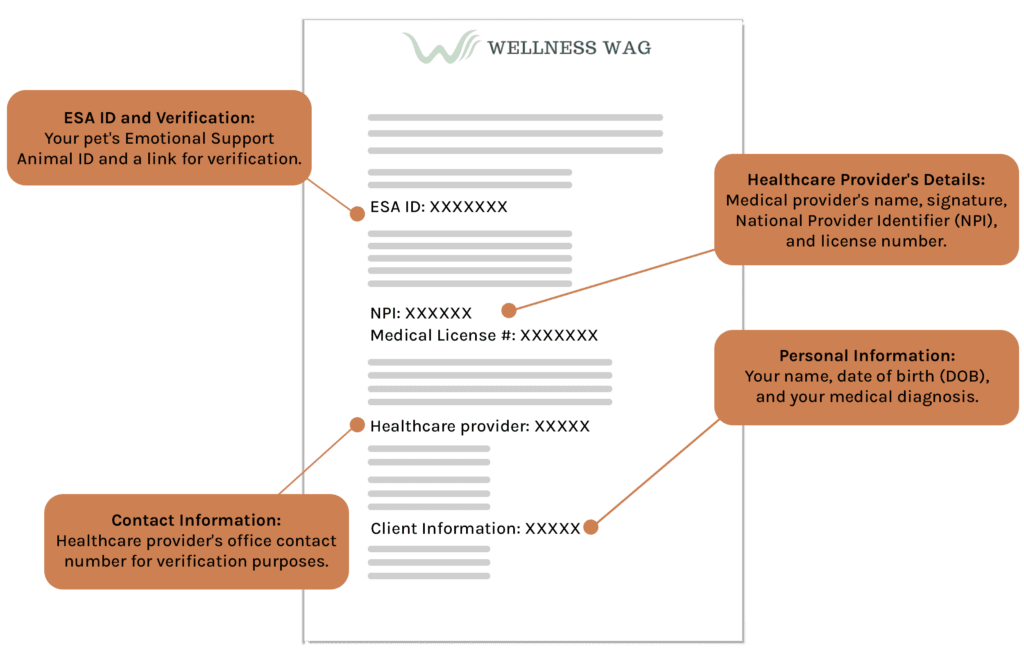Get Your Legitimate ESA Letter Online Today
SEEN BY OUR DOCTORS
if not approved
licensed medical providers
As seen on:
Get An Emotional Support Animal Letter In Your State
Experience Our Quick and Easy Process to Get Your ESA Letter

Discover Your ESA Eligibility
To begin your emotional support animal registration, answer a few brief questions regarding your Emotional Support Animal (ESA) requirements.

Consult with an Experienced Doctor
Meet with one of our licensed medical professionals in your state to get your online ESA letter.

Obtain Your Official ESA Letter
Receive your official emotional support animal letter within 24 hours of getting approved.

If your ESA Letter is not approved,
we will refund 100% of your payment

If your ESA Letter is not approved, we will refund 100% of your payment
Your ESA Letter Contains the Following:

ESA Letter Walkthrough: Your Visual Guide to Comfort and Connection
Experience the simplicity and significance of the Emotional Support Animal letter process with our comprehensive video walkthrough – your key to a happier, healthier life.
See what our happy pet parents have to say…
What is an emotional support animal?
An Emotional Support Animal (ESA) is an essential source of support for individuals with mental and/or emotional disabilities, providing invaluable assistance and comfort.
As awareness and understanding of mental health conditions grow, medical professionals can better diagnose previously overlooked conditions. In many cases, an ESA becomes an indispensable component of an individual’s coping process. While ESAs differ from service animals, which are trained to perform specific tasks, their impact on a person’s life can be equally significant. ESAs offer a comforting presence that helps individuals navigate their daily tasks more effectively.
It is important to note that ESAs, like service animals, are protected by state and federal laws, ensuring their rights and recognition.
Get an Emotional Support Animal Letter Online in Your State
Who qualifies for an emotional support animal?
Individuals with a mental or emotional disability, which encompasses conditions that significantly impact their daily lives, can benefit from having a support animal. Such disabilities may include, but are not limited to:
- Anxiety
- Depression
- PTSD
- Stress
- Personality Disorders
- Schizophrenia
- Phobias
These are just a few examples of the numerous mental or emotional challenges one might face on a regular basis. The positive impact of pets on mental health and well-being is well-established. Consequently, various mental and emotional issues can greatly benefit from the presence of a support animal.
Emotional Support Animals, Service Dogs, and Therapy Pets
Emotional Support Animals (ESAs)
Emotional Support Animals (ESAs) offer emotional support and comfort to individuals with disabilities. They do not require specific training or formal registration and play a vital role in providing assistance and alleviating symptoms. Unlike Service Dogs, ESAs do not have public access rights.
Definition: Offers emotional support and comfort to individuals with disabilities
Purpose: Alleviates symptoms of various disabilities and provides emotional assistance
Legal Status: Accommodation under certain laws, may vary by jurisdiction
No specific training requirements
No formal registration required
No public access rights like service dogs
Service Dogs
Service Dogs are extensively trained to perform specific tasks that assist individuals with disabilities. They have public access rights and can be registered with reputable organizations for documentation purposes. Service Dogs play a crucial role in mitigating their owner’s disability in various contexts.
Definition: Specifically trained to perform tasks that assist individuals with disabilities
Purpose: Assists with specific tasks to mitigate the owner’s disability
Legal Status: Protected by the Americans with Disabilities Act (ADA)
No specific training requirements
Registration: Can be registered with reputable organizations for documentation purposes
Training: Extensive training to perform tasks related to the owner’s disability
Public Access Rights: Granted public access rights
Therapy Pets
Therapy Pets provide comfort and emotional support in therapeutic settings, contributing to the emotional well-being of individuals. While they may not have specific legal status or public access rights, Therapy Pets undergo training tailored to the specific therapy or intervention being provided. Examples of animals in these categories can include dogs, cats, birds, horses, and more.
Definition: Trained to provide comfort and emotional support in therapeutic settings
Purpose: Enhances emotional well-being and provides comfort in therapeutic settings
Legal Status: No specific legal status, may vary by jurisdiction
Registration: No specific registration requirements
Training: Training may vary based on the specific therapy or intervention being provided
Public Access Rights: Access restricted to therapeutic environments
Common Emotional Support Animal vs. Service Dog Questions
What is a service dog and what tasks do they perform?
A service dog is specifically trained to assist individuals with disabilities by performing tasks such as guiding the visually impaired, alerting individuals with hearing impairments, or providing mobility assistance. These dogs are protected by the Americans with Disabilities Act (ADA) and have public access rights.
What is an emotional support animal (ESA) and how do they differ from service dogs?
An emotional support animal provides therapeutic support and companionship to individuals with emotional or mental health conditions. Unlike service dogs, ESAs do not require specialized training for specific tasks. They offer comfort and emotional support, and their presence can help alleviate symptoms of anxiety, depression, or other mental health challenges.
Can emotional support animals accompany their owners in public places?
Emotional support animals do not have the same legal access rights as service dogs. While ESAs are not granted public access under the ADA, they are protected under the Fair Housing Act (FHA) and the Air Carrier Access Act (ACAA), allowing them to accompany their owners in housing and during air travel.
Is it necessary to have a formal certification or registration for an emotional support animal?
Unlike service dogs, emotional support animals do not require formal certification or registration. However, individuals may need an emotional support animal letter from a licensed mental health professional. This letter serves as documentation of the person’s need for an ESA and is typically required to access housing or travel accommodations.
Can a service dog also be considered an emotional support animal?
Yes, a service dog can also provide emotional support to their owner, but they are primarily trained to perform specific tasks related to their owner’s disability. While service dogs may offer emotional support, they have distinct legal protections and access rights that are different from emotional support animals. It’s important to understand the specific rules and regulations associated with each category.
Unlock the Benefits of Emotional Support Animals
Discover the Effortless Way to Get Your Legitimate ESA Letter online with Wellness Wag

Step 1: Complete Our Assessment
Start your journey by completing our simple assessment. Share essential information about your situation and emotional pet support needs. This helps us tailor our services precisely to meet your requirements when you’re seeking an emotional support animal in your state.

Step 2: Consult with Medical Physicians
Once you’ve submitted the necessary forms, we’ll connect you with a licensed medical doctor in your state. Have a personalized consultation and undergo a comprehensive evaluation to determine your eligibility for an ESA.

Step 3: Receive Your ESA Letter
Upon confirmation by our licensed medical doctor, you’ll receive a professionally crafted ESA letter with legal recognition within 24 hours of your consultation.
We offer a unique Money Back Guarantee to ensure a stress-free experience with your pet. If, for any reason, your legitimate ESA letter doesn’t work, we will refund your money in full. Whether it’s due to non-qualification or illegal denial by your landlord, we’ve got you covered. Our policy guarantees a 100% refund for two reasons: if you don’t qualify after the consultation or if your landlord rejects the letter despite HUD complaint. Your satisfaction is our priority, and we stand behind the effectiveness of our ESA letters.
Embrace the transformative benefits of emotional support animals with ease. Choose Wellness Wag for a smooth process guided by our trusted team of medical physicians. Enjoy the positive impact of the ESA experience for you and your furry companions.
DISCOVER Wellness Wag:
Your Dedicated Emotional Support Animal Partner
We at Wellness Wag, comprise a team of devoted professionals who believe in enhancing lives through the healing power of emotional support animals. With our extensive experience in the sector, we’ve aided countless individuals in finding tranquility, comfort, and a revitalized sense of well-being through the companionship of an Emotional Support Animal.
Our objective at Wellness Wag is to ensure reliable and accessible Emotional Support Animal Letters consultations. This provides individuals battling emotional and mental health issues the chance to witness the life-changing impact of an ESA’s companionship. We are committed to equipping our clients with the knowledge and resources to navigate this process with confidence and empathy.




